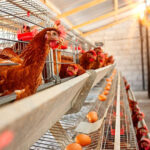The Farmer’s Challenge
Like many poultry farmers in Ghana, Mr. Kofi had a dream: to supply fresh eggs to local markets at scale. But running a farm of 30,000 layers seemed impossible with traditional methods. Land was limited, labor costs were high, and deep-litter farming made hygiene difficult to maintain.

The Turning Point
In 2024, Kofi partnered with a leading poultry equipment supplier to adopt the A-Type 4-tier, 5-door layer cage system. Each cage set could hold 160 birds, and with 184 sets installed, his dream of housing 30,000 layers became a reality.
What Changed with A-Type Chicken Cages
- Automatic Feeding: No more carrying sacks of feed by hand. Feed distribution is uniform and fast.
- Clean Drinking Water: Nipple drinkers reduce spillage and disease risks.
- Manure Management: Scraper systems remove waste daily, improving air quality and reducing ammonia levels.
- Easy Expansion: Modular cage design allows the farm to scale in the future.
The Results
- Daily Egg Output: Over 26,000 eggs per day, supplying both local retailers and wholesalers.
- Reduced Mortality: Better hygiene and ventilation lowered disease risks.
- Lower Costs: Labor needs fell from 20 workers to just 8, cutting expenses significantly.
- Higher Profits: With reduced waste and stronger production, profits increased by over 25%.

Lessons for Other Farmers
Kofi’s story shows that even in regions with limited infrastructure, adopting modern poultry equipment like the A-Type layer cage system in Ghana makes large-scale farming possible. The key is automation: it saves time, protects flock health, and ensures consistent egg production.
Final Thought
For farmers across Africa looking to scale, the Ghana 30,000 layer chicken cage system project is a model to follow. The right technology can turn ambitious goals into profitable realities.






